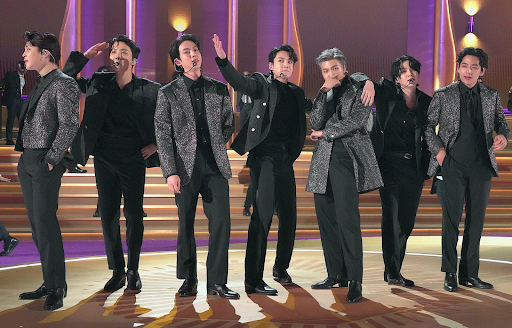
K-pop’s popularity is utterly unprecedented. Never before has non-Western or even non-American music been so popular all around the world. But in 2023 alone, 35 different K-pop albums entered the Billboard 200, with 5 of them taking the No. 1 spot [1].
So, how did they do it?
The answer lies in the fact that K-pop functions like an industry. Led by large companies like HYBE (the superpower behind BTS) or YG (home to BLACKPINK), industry leaders prioritize making money just as much as creating art, turning K-pop into a business that churns out artists and music for international stardom with a factory-like rhythm.
Under the direction of K-pop CEOs, K-pop idols must have superhuman qualities to be successful performers. Required to both dance intense choreographies that sometimes even include backflips and sing melodies full of throat-tearing high notes, K-pop performances can feel more like a exhaustive gymnastics routine, filled to the brim with visual, audio, and stage elements designed to catch one’s attention with every passing second [2, 3]. They’re tiring and aggressive, but in terms of business, succeed wonderfully to attract viewers in a world where video platforms like TikTok have whittled our attention spans down to the seconds.
K-pop songs themselves are oriented towards the masses too. Instead of using a model like the West, where artists are often both singers and songwriters, K-pop companies invite professional in-house producers and lyricists to write songs for their artists, sometimes meaning that their artists are merely obedient performers [4]. In fact, the members of K-pop’s most well-known girl group BLACKPINK have only been credited as contributors to the songwriting process for one of their title tracks in their entire 7-year discography [5]. K-pop idol One even notes how creativity in the industry feels like a hierarchy, “with the label at the top, and the artist in a position where they just have to take direction” [6]. But professional producers undoubtedly better companies’ chances of crafting popular “earworm” tracks that get them the most attention.
Hopeful tweens and teens must also display a plethora of marketable qualities, including exceptional singing, talented dancing, and breath-taking appearances to be taken under a large label’s wing [7]. In search of these qualities, potential idols are often scouted by companies too, such as Le Sserafim’s Kazuha, who was scouted by HYBE for her internationally recognized ballet skills [8]. Nowhere else in the world are artists trained the way K-pop artists are either: many spend years, even decades, like TWICE’s Jihyo, spending hours in their company dorms diligently learning how to sing and dance to please the public [7, 9]. In K-pop, artists are arguably created more so than they are born.
But there’s no doubt that the industry’s factory-like business comes with many unsettling downsides. As an APUSH student, K-pop reminds me of the Gilded Age of American history: monopolies by big corporations, disputed worker’s rights, and unsafe working conditions are all present in K-pop. K-pop, for instance, is dominated by 4 companies, so much so that they’re known as the Big 4: SM, YG, JYP, and HYBE [10]. Nearly every successful K-pop act, from BTS to BLACKPINK or from TWICE to NCT, hails from the Big 4, making the success of an idol just as or even more dependent on the size of their company than their personal endeavors [11, 12, 13, 14].
“Slave-contracts” are a well-known tactic of large labels as well. Starting from their training days, K-pop artists are subject to strict limitations on everything from their dating lives to their diets [7]. Former K-pop trainee Euodias even shared in a 2020 BBC interview how K-pop companies commonly encourage trainees to get plastic surgery to fulfill Korean beauty standards. She also notes that trainees often faint from the grueling training and inhumane dieting [15]. It’s also deeply upsetting to note the prevalence of suicide within the industry, which has been recently morning the losses of ASTRO’s Moonbin and f(x)’s Sulli [16, 17].
But it would be unjust to forget the exceptions to the rule. Self-made idols, like Stray Kids or (G)-IDLE, who have self-produced nearly their entire discography, do exist [18, 19]. It would also be wrong to assume an industry-led model would make the expression of art impersonal: K-pop artists have used their melodies to raise awareness for a plethora of issues, ranging from feminism to mental health to concern for Australia’s wild fires [20, 21, 22].
Despite its Gilded Age tactics, the K-pop industry’s top-down system has defiantly challenged the definition of art. Here in the West, as HYBE’s chairman Bang Si-hyuk assessed in a 2019 TIME magazine interview, art is often perceived as a deeply personal act that must be authentic to be successful [23]. But the industry’s overwhelming success reveals that art can also be turned into a business, and displays how a model of competitive business culture can even push a niche genre of music virtually unknown to the rest of the world to globally recognized anthems.
Sources:
[1] https://www.billboard.com/lists/k-pop-artist-100-list-2024-ranked/
[2] https://youtu.be/Gru59R_ECNA?si=dcMueutSRy-AanOv&t=112
[3] https://www.youtube.com/watch?v=1c_3pK15yWg
[5] https://genius.com/albums/Blackpink/The-album
[6] https://www.vice.com/en/article/884gkp/k-pop-system-profile-korean-rapper-one
[7] https://www.vox.com/culture/2018/2/16/16915672/what-is-kpop-history-explained
[8] https://www.j-14.com/posts/le-sserafims-kazuha-meet-the-ballerina-turned-kpop-idol/
[11] https://hybecorp.com/eng/company/artist
[12] https://www.ygfamily.com/en/artists/blackpink/main
[14] https://www.smentertainment.com/en/artist/
[15] https://www.bbc.com/news/stories-51476159
[16] https://www.vice.com/en/article/mbmkw3/opinion-kpop-toxic-fandom-death-depression
[17] https://time.com/6273299/moon-bin-astro-dead/
[18] https://straykids.jype.com/Default/DiscographyList
[19] https://genius.com/artists/Gi-dle
[20] https://www.youtube.com/watch?v=6f3RzjXPQwA
[21] https://www.youtube.com/playlist?list=OLAK5uy_n2_nP6zBi1PxoJIJl9pUsAcG9oEp08YBw
[22] https://www.youtube.com/watch?v=UcGWYKHBDA4
[23] https://time.com/5681494/bts-bang-si-hyuk-interview/
